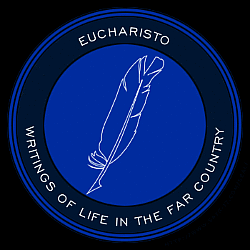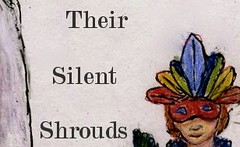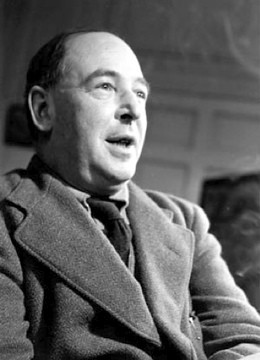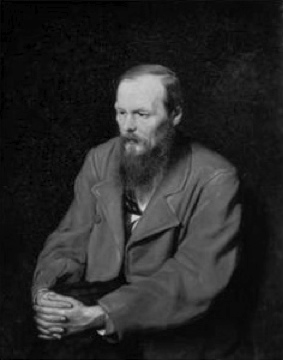This Review Is Long Overdue...
...Not because I promised to do it in some past post, but because the book, 'The Man Who Was Thursday' deserves mention by all those who've read it and have understood the theological implications in it.
Put quite simply, 'The Man Who Was Thursday' is a masterpiece. A slice of literary genius hidden among many other more popular, but quite mediocre books. It is in my opinion G.K. Chesterton's greatest work, and throughout the pages of the book he wove his being, the essence that defined him.
The book itself is quite short, barely 200 pages, yet in the text he wrote his cry for the continued life of rationality and western Christian thought. It covers ideas and moral issues such as rationality, moral relativism, nihilism, and addresses Christian thoughts such as peace and suffering, God's absolute power in our lives, and much more. And in his fine fashion, he molds all the ideas into one great, exciting, confusing misadventure that charms all who read it.
Interestingly, The Man Who Was Thursday has less to do with a great fantasy like The Lord of the Rings than it does with the movie, It's A Mad, Mad, Mad, Mad World. The whole book is one big chase, from beginning to end, and it brings our hero, Gabriel Syme, from England all the way across Europe, and back. It's very fast paced, and it could easily fool the less attentive reader into thinking it's just a long fractured fairy tale. But in reality, G.K. Chesterton wrote into the madcap story the realities of true goodness, the subtlety in the balance between sin and salvation, and the horror of complete evil.
On a side note quickly, this book contains an interesting bit of Chesterton trivia in it. It's kind of a riddle for those who don't know, but the name of the protagonist is Gabriel Syme, which at first glance, seems unimportant. But when looked at closer, we find that in a name dictionary, Gabriel is a variation of Gilbert, and the surname Syme, comes from an old-english word meaning, 'One in the Same', or something to that effect. So what we find as meaning in the hero's name is 'Gilbert, one in the same'. Many take this to mean that this was in some ways a fictional story telling the story of an actual life, that of G.K. Chesterton. It may have been in some ways, an autobiography.
The story begins with our Character coming into a conversation with a poet who lives for anarchy, the ideals of those who wish destruction of all men, and ultimately, themselves. He delves into a conversation that leads to events through which a great conspiracy is unmasked to Syme, and through a turn of events, he himself finds himself secretly taking part as a type of agent for truth in an movement of disorder and false hope. On another side note, it should be mentioned that this book was published in 1906, contemporary with a movement of anarchism, that found it's roots in people such as Nietzsche, through the idealism of nihilism, and eventually materialised in the form of communism, and socialistic order, found only a decade later in Russia.
Syme, in his unique position begins to probe what the order of people he has secretly joined is all about, and in a short while, stumbles into a trail with unexpected twists and turns, that could mean good or evil for him. His trail leads him to many suprises, that open his eyes to the subtleties of truth that lay, awaiting our finding them.
Beyond the small description I've given above of the book, I can't say much. It is the kind of book that if the plotline was revealed, even in part, it would spoil the interesting hand that the book has to play. Hopefully, instead of pouring over this review for ever, you will go to your local library and check out The Man Who Was Thursday, and read it for yourself. It has so many delightful suprises to offer, and if understood in it's entirety, answers many questions that haunt our modern philosophies. If only to aquaint yourself with G.K. Chesterton, by all means read it, for it truely was autobiographical, portraying who Chesterton really was. I consider it one of the great apologetical calls for Christianity, and should be counted among the finest Christian thought has to offer. It truely is a masterpiece.
Postscript:
For many who read it the first time around, it brings up a lot more questions than it answers, and it must be taken as a work almost that must be exegeted to be understood fully. I hope in the future to write a thesis of the ways everything ties in. If you have a question about the book, don't hesitate to post it.
Put quite simply, 'The Man Who Was Thursday' is a masterpiece. A slice of literary genius hidden among many other more popular, but quite mediocre books. It is in my opinion G.K. Chesterton's greatest work, and throughout the pages of the book he wove his being, the essence that defined him.
The book itself is quite short, barely 200 pages, yet in the text he wrote his cry for the continued life of rationality and western Christian thought. It covers ideas and moral issues such as rationality, moral relativism, nihilism, and addresses Christian thoughts such as peace and suffering, God's absolute power in our lives, and much more. And in his fine fashion, he molds all the ideas into one great, exciting, confusing misadventure that charms all who read it.
Interestingly, The Man Who Was Thursday has less to do with a great fantasy like The Lord of the Rings than it does with the movie, It's A Mad, Mad, Mad, Mad World. The whole book is one big chase, from beginning to end, and it brings our hero, Gabriel Syme, from England all the way across Europe, and back. It's very fast paced, and it could easily fool the less attentive reader into thinking it's just a long fractured fairy tale. But in reality, G.K. Chesterton wrote into the madcap story the realities of true goodness, the subtlety in the balance between sin and salvation, and the horror of complete evil.
On a side note quickly, this book contains an interesting bit of Chesterton trivia in it. It's kind of a riddle for those who don't know, but the name of the protagonist is Gabriel Syme, which at first glance, seems unimportant. But when looked at closer, we find that in a name dictionary, Gabriel is a variation of Gilbert, and the surname Syme, comes from an old-english word meaning, 'One in the Same', or something to that effect. So what we find as meaning in the hero's name is 'Gilbert, one in the same'. Many take this to mean that this was in some ways a fictional story telling the story of an actual life, that of G.K. Chesterton. It may have been in some ways, an autobiography.
The story begins with our Character coming into a conversation with a poet who lives for anarchy, the ideals of those who wish destruction of all men, and ultimately, themselves. He delves into a conversation that leads to events through which a great conspiracy is unmasked to Syme, and through a turn of events, he himself finds himself secretly taking part as a type of agent for truth in an movement of disorder and false hope. On another side note, it should be mentioned that this book was published in 1906, contemporary with a movement of anarchism, that found it's roots in people such as Nietzsche, through the idealism of nihilism, and eventually materialised in the form of communism, and socialistic order, found only a decade later in Russia.
Syme, in his unique position begins to probe what the order of people he has secretly joined is all about, and in a short while, stumbles into a trail with unexpected twists and turns, that could mean good or evil for him. His trail leads him to many suprises, that open his eyes to the subtleties of truth that lay, awaiting our finding them.
Beyond the small description I've given above of the book, I can't say much. It is the kind of book that if the plotline was revealed, even in part, it would spoil the interesting hand that the book has to play. Hopefully, instead of pouring over this review for ever, you will go to your local library and check out The Man Who Was Thursday, and read it for yourself. It has so many delightful suprises to offer, and if understood in it's entirety, answers many questions that haunt our modern philosophies. If only to aquaint yourself with G.K. Chesterton, by all means read it, for it truely was autobiographical, portraying who Chesterton really was. I consider it one of the great apologetical calls for Christianity, and should be counted among the finest Christian thought has to offer. It truely is a masterpiece.
Postscript:
For many who read it the first time around, it brings up a lot more questions than it answers, and it must be taken as a work almost that must be exegeted to be understood fully. I hope in the future to write a thesis of the ways everything ties in. If you have a question about the book, don't hesitate to post it.
















1 Comments:
Great review Joel - would like to read more. You did well to sum it up without giving too much away! I once saw a play of it done by a cast of only 3 or 4 actors - they managed to imply all the characters at once by dressing in split costumes, and turning their profiles to act different 'days'. Madcap, enjoyable but never was going to top G.K's wonderful prose. More message left on your guestbook.
Post a Comment
<< Home